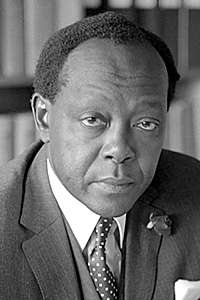Charles Njonjo

Charles Mugane Njonjo (born 23 January 1920) is a former Attorney General of Kenya (1963 – 1979), and Minister of Constitutional Affairs (1980 – 1983). Charles Njonjo is also popularly referred to as "The Duke of Kabeteshire".[1][2]
Early life and career
Njonjo was the son of Josiah Njonjo, a colonial paramount chief and one of the foremost collaborators of British rule in Kenya.[3] The Njonjo family were close friends of Harry Leakey, whose son (Louis) and grandson (Richard) would later play important roles in archaeology and kenyan politics.[4] As the son of a collaborator, Njonjo led a pampered lifestyle, later remarking how he would ride to school on a horse delivered by a servant, at a time when Africans were under a sustained assault on their way of life by the colonial government.[5] After completing his secondary education at Alliance High School in Kikuyu, Njonjo enrolled at Fort Hare University in South Africa, where he graduated with a Bachelor's Degree in Law. He returned to Kenya and was appointed a legal clerk in the colonial government in 1955, having completed a Law degree at Lincoln's Inn in the United Kingdom. This was at the height of the state of Emergency, which had been declared in order to defeat the attempts of Mau Mau freedom fighters to gain independence. Njonjo diligently served the government as it went about performing horrendous atrocities, gaining a reputation as a diligent lawyer, and therefore being considered for Attorney General in the Independent Kenya.[6] With Njonjo at the helm of the judiciary and other legal apparatus in Kenya, the government policy on dispossession of Africans by White colonialists surprisingly continued unabated. In view of the illegal actions of the British in quelling the Mau Mau uprising, and other liberation movements, Njonjo and the government he served in did not institute any measures to address the injustice, instead taking an active role of thwarting any such attempts.[7] it was only 50 years later that the Kenyan government finally outlawed Mau Mau and joined their quest for compensation by the British government. He was also a proponent for continued ties with regimes such as White - ruled Rhodesia, apartheid South Africa and Portuguese Mozambique, at a time when other African countries stood shoulder to shoulder with their oppressed comrades in their quest for independence and an end to racially - inspired rule. These actions have defined the frosty South Africa - Kenyan relations since then.[8] On Kenyan politics, Njonjo always had designs for the top job of president. while he had registered the G.e.m.a. association, he would soon become an opponent of the group, when he viewed them as a threat to his plans. His plan was to have the then vice president, Daniel Moi, succeed Kenyatta. Feeling that Moi would be weak, he could easily dislodge him from the presidency and become president himself. To destroy GEMA, in 1976, he charged some of its members including Kihika Kimani and Njenga Karume with treason. The order was soon overturned, however, by the president, Jomo Kenyatta.[9]
Miller Inquiry
Kenyatta would die in 1978, to be succeeded by Moi as Njonjo had anticipated. in 1980, he quit his post a attorney General. He ran for election and won the Kikuyu constituency seat in elections held thereafter. Moi appointed him Minister of Constitutional Affairs. after the attempted coup of 1982, Moi decided to purge his party and cabinet of figures he had established wanted him out of power. Chief among them would be Njonjo, and powerful internal Security minister, G.G. Kariuki. He was dragged through a judicial inquiry, which concluded that he had abused office, and had tried to take over power form Moi. he was forced to resign, effectively destroying his political career. Daniel arap Moi. In the early 1980s he was the chairman of the East African Wildlife Society.[10][11]
Return to Public Life
In 1998 he returned to public life, and was appointed chairman of the Kenya Wildlife Service.[12] In October 2006 there were indications that Njonjo was attempting a comeback in Kenyan politics, including his show of support for Raila Odinga.[13] Today, Njonjo remains one of the richest people in the country. He has extensive landholding across the country. He also owns interests in high profile financial institutions, including banks and insurance companies.
References
- ↑ Alan Rake (1993). Who's Who in Africa: Leaders for the 1990s. Scarecrow Press. p. 153. ISBN 0810825570.
- ↑ The Standard, July 11,2014
- ↑ Bach, Daniel; Gazibo, Mamoudou (2012). Neopatrimonialism in Africa and beyond. New York: Routledge. ISBN 978-0-415-68793-5.
- ↑ chief, F. Abiola Irele, Biodun Jeyifo, editors in (2010). The Oxford encyclopedia of African thought. New York: Oxford University Press. ISBN 978-0-19-533473-9.
- ↑ "Charles Mugane Njonjo – Kenyatta’s powerful Attorney-General – Kenya Yearbook". kenyayearbook.co.ke.
- ↑ "Sir Charles Njonjo Biography, Family, Wife Children and Wealth". infolinks.co.ke. 28 November 2015.
- ↑ Okungu, Jerry (30 May 2008). "Africa: South Africa And Kenya Share a Common Fate". New Vision (Kampala).
- ↑ correspondent, Owen Bowcott Legal affairs (22 May 2016). "Mau Mau lawsuit due to begin at high court". The Guardian.
- ↑ Daily Nation, December 4, 2009: The mid-air plot to block Moi succession — and the day Mzee had the last laugh
- ↑ Swara Magazine, Vol. 6, No. 5, 1983
- ↑ Kenya Cabinet Official Faces An Inquiry on 'Irregularities', The New York Times, June 30, 1983
- ↑ Veteran Kenyan politician rehabilitated, BBC, July 10, 1998
- ↑ The return of Charles Njonjo, Kenya Times, October 27, 2006